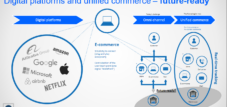Why are digital B2B trading platforms so important for German mechanical engineering and SMEs? | Digital company know-how
Language selection 📢
Published on: April 2, 2024 / Update from: April 2, 2024 - Author: Konrad Wolfenstein

Digital B2B trading platforms and international corporate know-how for global German mechanical engineering and SMEs - Image: Xpert.Digital
🌐 German mechanical engineering and digitalization
🔍 Global challenges
German mechanical engineering is traditionally heavily involved in the export business. Its products - marked with the worldwide -respected seal “Made in Germany” - is synonymous with quality, durability and innovation. Export plays a major role in the business success, especially in times of a weakening inland economy. The stability and progress of many industries depend significantly on the continuous dynamics of external trade.
German SMEs are generally geared towards strong export. Especially in times of poorer internal market, it is extremely important that export stays going. But here other countries Germany run the rank. Not because the German products have become “too expensive” or “qualitatively worse”, the “Made in Germany” is still as before the global standard par excellence, but because German products in international digital trade are far from being represented in comparison. This poor to lack of visibility of German products and machines in digital competition leaves potential customers no choice but to choose products and machines from other countries.
💡 Digital adaptation
However, German SMEs are often faced with the problem of keeping pace with the rapid development of other countries. It is not the question of product quality or too high prices that threaten the German position. Rather, it is due to the sometimes hesitant adaptation of digital commercial and sales channels through which German companies lose visibility in international e-commerce. This exposes them to an increased risk of being left behind by the globalization of the digital market. As a result, potential buyers opt for products that may not have the quality “made in Germany”, but are still easier to find and be available.
✨ Digital opportunities and possibilities
The age of digitalization not only presents challenges, but also opens up many opportunities. Viewed from this perspective, digital transformation offers German SMEs immense opportunities to open up new markets and secure existing market shares. They have the potential to expand their international competitiveness with the help of technological innovation, agile working methods and the development of digital sales channels.
In the area of digitalization, German SMEs have enormous potential to catch up! So it's not a challenge, but a potential opportunity for German SMEs to make up for this shortcoming quickly and efficiently with the right, strong partners and industry experts.
🛠 Integrated digital strategy approach
To achieve this, it is crucial to see the digital agenda not just as an area alongside the core business, but as an integral part of the corporate strategy. E-commerce, digital marketing, the use of social media and the use of big data for market and customer analysis are examples of tools that SMEs can use to increase their visibility and reach. The development and integration of digital services related to physical products - such as predictive maintenance - also mark additional service areas that can create competitive advantages.
B2B marketing requires a fundamentally different approach than B2C marketing. Since these are often larger investments and multiple stakeholders are involved in the purchasing decision, the sales cycle is usually longer and the associated customer relationship is far more complex. Products must not only meet immediate needs, but also provide long-term value to the customer's business. The trust and credibility of a company are therefore crucial. And in this respect, German SMEs are almost unbeatable in a global comparison.
🚀 Innovation and reassessment
The implementation of digital business models and processes often requires a reassessment of previous approaches. Business model innovation is a key concept. For example, platform solutions can accelerate developments and build a bridge to new customer groups and markets. Platforms are particularly important in the B2B sector, for example by making collaboration between suppliers and manufacturers more efficient.
🎓 Importance of education and competence
Digital education and skills development also play a central role. A digitally competent team that is willing to break new ground and develop innovative solutions is essential to survive in the competition. Investments in employee training not only ensure the future viability of the company, but also enable staff to actively participate in the digital design of the company.
📜 Political framework conditions
Politics also plays a key role in shaping the framework conditions for the digitalization of the economy. Funding programs, investments in digital infrastructure and the creation of incentives for research and innovation can support SMEs in making the leap into digitalization.
🔁 Strategy and individual transformation
However, it is not enough to recognize the need for change – a concrete implementation strategy is required. The transition to digital business models is individual for each company and must be in line with its own resources and skills. Significant focus on customer needs and market requirements is required for the transformation to be successful.
🔄 Effective digital strategies
An effective strategy usually includes a comprehensive market analysis, identifying digital touchpoints with customers, prioritizing digital projects based on their value contribution and establishing agile project management methods. The use of cloud technologies, artificial intelligence and automation can further optimize operational processes.
🤝 Partnerships and expertise
The commitment of strong partners and industry experts is extremely important. They not only bring the necessary technological know-how, but also open doors to networks and synergies that are often difficult to access for SMEs alone. Knowledge of local conditions and business practices is particularly important in connection with international markets and multicultural customer groups.
⚖️ Decisive decisions
The German economy is therefore facing a crucial fork in the road. Digital change is both a challenge and a great opportunity and offers SME the opportunity to transfer existing success stories to the digital age and open new chapters. The strategic use of digital technologies and the forging of partnerships can strengthen the international position of German SMEs and secure their future. So “Made in Germany” remains a promise of quality that demonstrates its value again in a digitally networked world.
📣 Similar topics
- 🛠️ Export strength of German mechanical engineering: ways to ensure internationality and quality
- 🌐 Challenges for SMEs in the age of globalization: Adaptation to digital markets
- 🚀 Opportunities of digitalization for expanding the export business of German companies
- 💡 The integration of digital strategies as the core of corporate development
- 🛰️ Predominant maintenance and services: Additional added value in mechanical engineering
- 🌉 Platform solutions as innovation bridges for German SMEs in the B2B sector
- 🎓 Importance of digital education and skills development for competitiveness
- 💼 The influence of political framework conditions on the digitalization of medium-sized companies
- 🎯 Development of an effective strategy for digital transformation in mechanical engineering
- 👥 The role of strong partnerships and networks in international market expansion
#️⃣ Hashtags: #GermanEngineering #Digitalization #SME #MadeInGermany #TechnologicalInnovation
📌 Other suitable topics
🇩🇪💪🔗 A trading platform for the B2B sector
🇩🇪 Importance of B2B platforms for SMEs
A trading platform for the B2B (business-to-business) sector represents a crucial tool for small and medium-sized enterprises (SMEs) in Germany to promote their business, especially in an environment increasingly dominated by digital transactions. In contrast to B2C (business-to-consumer) platforms, which address the end customer directly, B2B platforms aim to facilitate business relationships between companies and are therefore designed and operated in different ways.
🚀 Export orientation and digital challenges
The relevance of a B2B trading platform for German SMEs can hardly be overestimated. The historical focus of German SMEs on exports is not just an economic strategy, but a necessity given the size and competitiveness of global markets. The German economy is heavily export-oriented, which means that the strength of domestic SMEs is central not only to their survival, but also to Germany's economic growth as a whole. At times when the domestic market is weakening, the importance of exports becomes even clearer.
💡 Digital visibility as a key factor
Nevertheless, German SMEs are facing international competition. Although the predicate “Made in Germany” is still a sign of quality and reliability, its value is reduced by the lack of digital presence. In the digital age, where visibility correlates with a market share, a lack of online presence leads to German products on the international market. This is a significant deficit, because the limited digital visibility is lost valuable export potential.
💪 Opportunity for digital transformation
The need for digital transformation is therefore not only urgent for German SMEs - it is also an opportunity to strengthen competitiveness and promote growth. Integration into a B2B trading platform represents a big step here. By working with capable partners who have industry knowledge and technical know-how, SMEs can master this transition efficiently and effectively.
🎯 Specifics of B2B marketing
The special features of B2B marketing must be kept in mind. Selling products and services between companies involves greater complexity compared to the B2C market. The buying cycle is often longer because decisions are typically made by different stakeholders and require larger investments. For this reason, marketing must not only address immediate needs, but also provide demonstrable long-term value to customers' businesses. Trust and credibility are key elements in this context, and it is precisely here that German SMEs have a strong starting position due to their tradition, their quality standards and their technological lead.
🛠️ Functionalities of B2B platforms
The differences between B2B and B2C platforms lie in the functionalities and user experience. B2B platforms must not only ensure greater privacy and security, but also support more complex transactions, such as price negotiations, individualized orders and long-term contractual relationships. The user interface and design of a B2B platform are often designed to simplify complicated processes and enable efficient navigation.
🗣️ Communication in the B2B sector
Another difference concerns communication and marketing.
While the B2C sector focuses on emotional and impulsive purchasing reasons, B2B marketing is based on rational decision-making processes and emphasizes the direct benefit for the customer's business. The presentation of products and services must highlight technical specifications, performance values and post-sales support. Content marketing, i.e. informative and advisory content, plays a key role in B2B communication.
🔗 Complexity of B2B transactions
It should also be noted that B2B transactions are often characterized by a network of sales partners, resellers and other intermediaries. A B2B platform must therefore be able to map these complicated supply chains and relationships.
🤖 Future and technology
In the future, the importance of B2B platforms could continue to increase, as technological advances such as artificial intelligence and machine learning enable individually tailored shopping experiences and thus contribute to further increasing efficiency and customer loyalty. Intelligent algorithms could bring together supply and demand even faster and more precisely.
🌱 Sustainability through digitalization
In addition, it should not be forgotten that a strong online presence and digitalized processes can also contribute to sustainability. By optimizing supply chains and enabling virtual meetings instead of physical business trips, B2B platforms not only protect the environment but also save time and costs.
🚀 Strategic importance for SMEs
For German SMEs, a B2B trading platform represents much more than just a sales option: it is a strategic instrument to secure and expand their market presence, strengthen their competitiveness, increase their efficiency and support their long-term growth. In an increasingly connected and digital global economy, the adoption and optimal use of such a platform can determine whether an SME maintains or expands its market position, or whether it is overtaken by more agile and digitally savvy competitors.
📣 Similar topics
- 📈 Digital horizons: The importance of B2B platforms for German SMEs
- 🌐 Global trade: “Made in Germany” in the digital economy
- 🛠️ SMEs and digital transformation: The path to competitiveness
- 🛒 B2B vs. B2C: It depends on the specifics
- 💡 Tradition meets innovation: German SMEs on the digital marketplace
- 💼 Rational instead of impulsive: B2B marketing strategies for SMEs
- 🤝 Navigating complex networks: B2B platforms for business customers
- 🔍 Technology on the rise: AI in B2B trading platforms
- 🌿 Digital sustainability: B2B platforms and environmental protection
- ⚙️ Long-term growth: SMEs and strategies for online presence
#️⃣ Hashtags: #B2BPlatforms #GermanKMU #DigitalTransformation #Competitiveness #OnlinePresence
🎯🎯🎯 Benefit from Xpert.Digital's extensive, fivefold expertise in a comprehensive service package | R&D, XR, PR & SEM

AI & XR 3D Rendering Machine: Fivefold expertise from Xpert.Digital in a comprehensive service package, R&D XR, PR & SEM - Image: Xpert.Digital
Xpert.Digital has in-depth knowledge of various industries. This allows us to develop tailor-made strategies that are tailored precisely to the requirements and challenges of your specific market segment. By continually analyzing market trends and following industry developments, we can act with foresight and offer innovative solutions. Through the combination of experience and knowledge, we generate added value and give our customers a decisive competitive advantage.
More about it here:
We are there for you - advice - planning - implementation - project management
☑️ Industry expert, here with his own Xpert.Digital industry hub with over 2,500 specialist articles
I would be happy to serve as your personal advisor.
You can contact me by filling out the contact form below or simply call me on +49 89 89 674 804 (Munich) .
I'm looking forward to our joint project.
Xpert.Digital - Konrad Wolfenstein
Xpert.Digital is a hub for industry with a focus on digitalization, mechanical engineering, logistics/intralogistics and photovoltaics.
With our 360° business development solution, we support well-known companies from new business to after sales.
Market intelligence, smarketing, marketing automation, content development, PR, mail campaigns, personalized social media and lead nurturing are part of our digital tools.
You can find out more at: www.xpert.digital - www.xpert.solar - www.xpert.plus


























